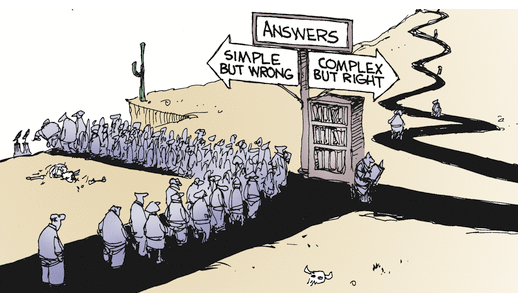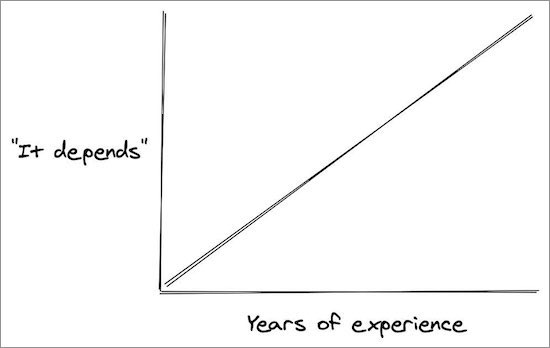The danger of Twitter as 'ultimate editor' of the news
By Mark Hurst • July 16, 2020
The Twitter-sphere was afroth this week on the news of Bari Weiss's departure from the New York Times. In her publicly posted resignation letter (July 14), Weiss complained about the "constant bullying" she suferred from coworkers who disagreed with her political views. Weiss has labelled herself a centrist; those on the left call her views conservative.
I'm not going to comment on Weiss's politics or her past columns, as I'm not well informed enough in that area, and anyway plenty of people across the political spectrum have posted their own reactions. (Choose your political stripe and have at it: here's a DuckDuckGo search.)
However, I do have expertise in digital technology, and Weiss's letter contained a striking assertion about tech that deserves a comment. Here's what Weiss wrote:
Twitter is not on the masthead of The New York Times. But Twitter has become its ultimate editor. As the ethics and mores of that platform have become those of the paper, the paper itself has increasingly become a kind of performance space. Stories are chosen and told in a way to satisfy the narrowest of audiences, rather than to allow a curious public to read about the world and then draw their own conclusions.
Strong words. Twitter has become the ultimate editor of the New York Times, and Twitter's ethics (or lack of them) have infused the organization. In my opinion, Weiss here is pointing to a bigger issue than the left-vs.-right political battle. To put it plainly, Silicon Valley has finally captured the New York Times, at least in the Opinion pages where Weiss wrote. This is exactly the problem I wrote about a few weeks ago in The algorithmic amplifier fueling corruption in Silicon Valley:
Twitter's algorithmic timeline promotes tweets that generate the most engagement - thus driving more attention to, and more cash from, Twitter's advertisers. For this reason, Twitter often shows you material from people you don't follow, and it doesn't show you material from people you do follow. You tend to see whatever gets the most attention and keeps you on the site. Facebook's algorithmic timeline does the same thing - amplifying and promoting content that gets the most engagement. And that means promoting garbage: toxic, divisive, harmful content.
Sadly, much of the discussion I've seen online has missed this point. Most of the comment on Weiss's departure has hinged on politics: people on the right bemoan "cancel culture," while people on the left deny any such thing and celebrate the Times' leadership. And while I could wade into the debate with my own thoughts, I think that's missing the real danger. While left and right scream at each other, Silicon Valley sits off to the side, tuning the algorithm to keep the fight going. It's an old strategy. As multiple sources have pointed out (from Baudelaire to "The Usual Suspects"), the greatest trick the devil ever pulled was convincing the world he didn't exist.
Coincidentally, the same day that Bari Weiss posted her resignation, Ross Douthat, a conservative who hasn't resigned from the Times, wrote about "cancel culture." Included in his ten theses were 4, 5, and 9 below. See if you can spot the common thread.
4. The internet has changed the way we cancel, and extended cancellation's reach.
5. The internet has also made it harder to figure out whether speech is getting freer or less free.
9. The heat of the cancel-culture debate reflects the intersection of the internet as a medium for cancellation with the increasing power of left-wing moral norms as a justification for cancellation.
It's the internet. And not just any internet, not just any network of computers: it's today's Silicon Valley internet, ruled by a cancerous growth-at-any-cost business model, overseen by unaccountable billionaires and their vassal engineers who tune the algorithm.
The destruction of reasoned debate makes a beautiful bonfire of profit for our Silicon Valley overlords. Free speech, free thought, reasoned give-and-take are all replaced with an unending stream of devastating insults and spectacular takedowns.

(from Non Sequitur by Wiley Miller)
Here's what I posted on Twitter this week:
• Twitter is not the place for reasoned argument.
• On the other hand, Twitter is great for dunks. And clever memes. I'm happy to share those when they align with what I think. But more often, expressing my thoughts would require a reasoned argument, so I keep them off Twitter.
• Facebook is even worse. It's like Twitter with a side order of genocide. That's why I don't even have an account there. (Same with Instagram and anything else Zuck touches.)
• Silicon Valley lied to us. They said their platforms would create community; in reality they destroy community. They said social media would let every voice be heard; instead it amplifies only the loudest, the famous, the most extreme. With this, the owners became billionaires.
• These platforms - including Twitter - profit from division, anger, and chaos. Reasoned argument doesn't make money for the algorithm, so it gets no amplification.
• When we were kids, we were taught: Don't hate. Listen before you speak. Do things for the benefit of others. Silicon Valley is re-educating us: Hate the other side. Yell, scream, curse as loud as you can. Do everything to promote yourself and you'll be rewarded with likes.
• In tuning the algorithm so that we tear each other apart, Silicon Valley achieves another goal: distracting us from their deadly business model of growth-at-any-cost. As long as we spend our time looking for "gotchas," we'll never ask why these companies are allowed to exist.
Read the whole thread here.

In the end, we have to consider our ultimate goal:
- Is it mild reforms and a few band-aids on the cancerous Silicon Valley blob?
- Is it "get along, go along" and hoping that someone ELSE will fix it?
- Or do we dare to ask what a better outcome might be? And what OUR responsibility is?
I think we need to consider what social media is doing to us.
Rip out the algorithms, take down the algorithmic timelines, and get back to human-to-human discussion.
Until that happens, remember one thing. The main issue isn't left vs. right, and it's not Democrat vs. Republican.
Instead, it's Big Tech vs. the rest of us.

(Above: This is the closest I want to get to feudalism.
Let's take down the toxic Silicon Valley monopolies.)
See also:
• Let Me Explain Why Miley Cyrus' VMA Performance Was [CNN.com's] Top Story This Morning, from The Onion in 2013, satirizing the problem of metrics-based reporting in online news.
• A 2015 Columbia Journalism Review report praising the New York Times, at least what the Times was five years ago, for resisting the lure of minute-to-minute Chartbeat dashboards. (It also includes a link to the Onion piece.)
• A 2017 essay by Maciej Ceglowski, concluding with these prophetic words:
Machine learning is . . . being deployed at scale with minimal ethical oversight, in the service of a business model that relies entirely on psychological manipulation and mass surveillance. The capacity to manipulate people at scale is being sold to the highest bidder, and has infected every aspect of civic life, including democratic elections and journalism. . . . This algorithmic takeover of the public sphere is the biggest news story of the early 21st century. We desperately need journalists to cover it. But as they grow more dependent on online publishing for their professional survival, their capacity to do this kind of reporting will disappear, if it has not disappeared already.
Until next time,
- Mark Hurst
Subscribe to my email newsletter
Email: mark@creativegood.com
Twitter: @markhurst
Podcast/radio show: techtonic.fm
- - -